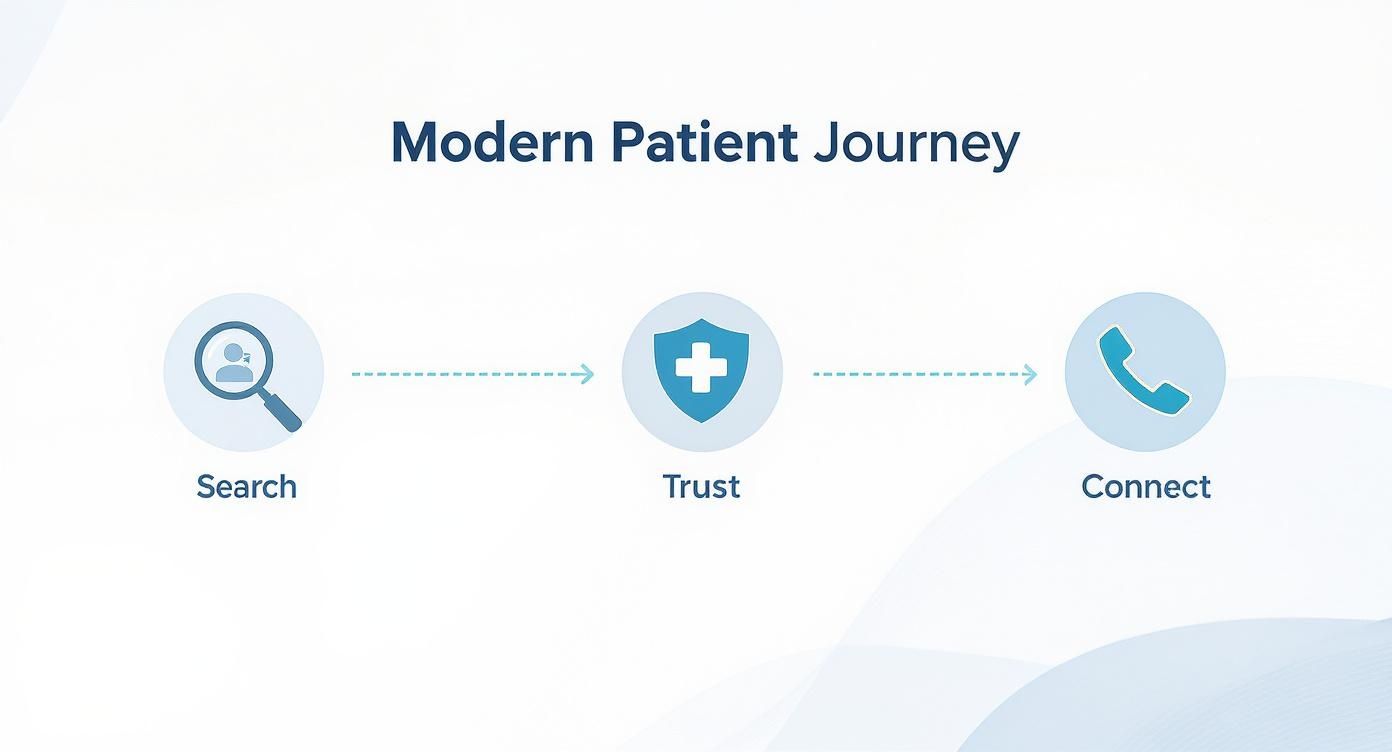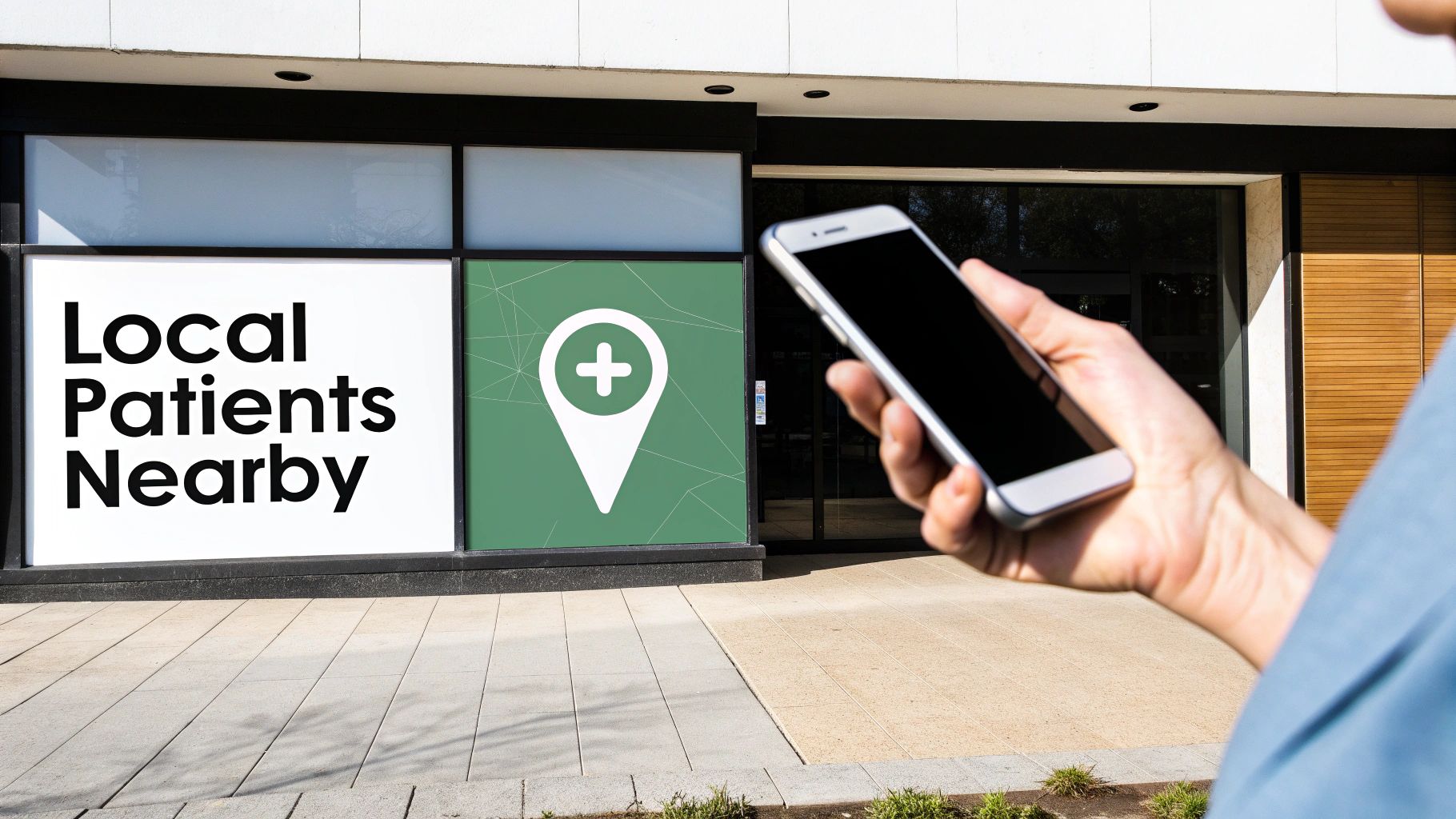Let's be clear: the way patients find mental healthcare has completely changed. Relying on business cards and doctor referrals is no longer enough. Today, your next patient is almost certainly starting their search on Google, often in a moment of real need.
This is why SEO (Search Engine Optimization) for psychiatrists is so critical. It's not just a marketing buzzword. It's the essential step to making your expertise accessible to people actively looking for it. A strong online presence builds trust before you've even had a single conversation.
Why SEO Is a Game-Changer for Psychiatrists
Think of SEO as a digital bridge. It connects someone searching for help with your professional services. When a person types "anxiety treatment in my city" or "psychiatrist for depression," you want your practice to be one of the first names they see.
This isn't about sales. It's about being visible when it matters most.
The Modern Patient Journey
The path a patient takes online is straightforward, but it hinges on trust at every step. From their initial search to finally making contact, they are constantly evaluating if you're the right fit.

It starts with a search for solutions. Then, it moves to vetting your practice for trustworthiness. Finally, it ends with them reaching out to schedule an appointment. Your online presence must support them through each phase.
Why Your Practice Can't Afford to Be Invisible
Statistics paint a clear picture. About 51% of all website traffic comes from organic search. A whopping 92% of people will pick a business from the first page of Google's results. This makes a high ranking non-negotiable. You can find more insights on why SEO is so important for therapists that apply here, too.
In Short: If your practice isn't on the first page of Google, you’re basically invisible to most potential patients.
Without a solid SEO plan, you miss countless opportunities to connect with people taking that brave first step. This isn't just about business growth; it's about fulfilling your mission to provide care. Good SEO ensures that when someone searches for a psychiatrist, your practice is right there.
Finding Keywords That Actually Work
To get SEO for psychiatrists right, you have to think like a patient, not a clinician. You're fluent in the DSM-5, but your potential patients are just trying to name their feelings. Your keyword strategy starts in that gap.
Sure, people search for "psychiatrist near me." You need to rank for that. But that’s just scratching the surface. The magic happens when you connect with the specific questions people type into Google late at night. These longer searches are called long-tail keywords.

Think about it. A search for "psychiatrist" is vague. But "how to get an adult ADHD diagnosis in Boston" comes from someone with a clear, urgent need. They are looking for a solution, making them a more qualified potential patient.
How to Uncover What Patients Are Really Asking
So where do you find these golden keywords? The best place to start is Google itself.
Just type in a service you offer and look for the "People Also Ask" box. It’s a goldmine of real patient questions.
Let’s say you offer TMS therapy. A search might show questions like:
- Is TMS therapy right for depression?
- What are the side effects of TMS therapy?
- How long does it take for TMS to work?
- Does insurance cover TMS therapy?
You now have four perfect topics for your website. You can address these on a service page or in a detailed blog post. Answering these questions directly establishes you as a helpful expert.
The "Why" Behind the Search: Understanding Intent
Not every search has the same goal. The motivation behind a search is called search intent. Matching your content to their intent will get you better results.
Generally, intent breaks down into a few types:
- Informational: They want answers. Think "what's the difference between a psychiatric and psychological evaluation." Blog posts are perfect for this.
- Commercial: They're weighing options. Searches like "best psychiatrist for teen anxiety" show they're getting serious. This is where your service pages shine.
- Transactional: They're ready to book. When someone searches "book a psychiatrist online," your contact and scheduling pages need to be flawless.
- Navigational: They're looking for you by name, like "[Your Practice Name]." Your homepage and contact info must be easy to find.
Your Keyword Toolkit and Game Plan
A few tools can make finding keywords easier. The Google Keyword Planner is a classic starting point. You can learn more about using Google's Keyword Tool to build out your strategy.
Once you have a list of keywords, create a plan.
- Map it out: Assign one main keyword to each core page (Homepage, About, Services).
- Cluster topics: Group related keywords and questions together. This becomes an outline for a service page or blog post.
- Get local: Weave location-specific keywords (like "child psychiatrist in Dallas") into your service pages and Google Business Profile.
This isn’t about tricking Google. It’s about building a helpful website that gives patients the clear, trustworthy answers they’re looking for.
Building a Website That Google and Patients Trust
Your website is more than a digital brochure. It’s your practice's front door. For many patients, it’s their first impression of you. Getting this right is the core of effective SEO for psychiatrists.
Think of your website as an extension of your office. It needs to feel professional, be welcoming, and be genuinely helpful. When someone lands on your site, they should feel they are in a safe, credible space.
Why Google Cares About Trust in Healthcare
For medical and mental health topics, Google holds websites to a high standard. This is called E-A-T, which stands for Expertise, Authoritativeness, and Trustworthiness. For a psychiatrist, this is non-negotiable.
Google's priority is ensuring people get health information from actual experts. Your website needs to radiate credibility.
This means being clear about:
- Your Credentials: List your medical degrees, board certifications, and licenses.
- Your Experience: Talk about your years in practice and any affiliations with respected hospitals or universities.
- A Professional "About Us" Page: This is your chance to make a human connection. A good photo and your philosophy of care go a long way.
In Short: A great "About Us" page helps a potential patient see the person they'll be trusting with their care.
Crafting Pages That Connect and Convert
Every page on your website has a job. Your service pages, especially, must do more than list conditions you treat. They need to speak directly to what a person is going through.
Service Page Essentials
Let’s say someone searches for "TMS therapy for depression." Your page on TMS can't be a dry, clinical definition. It has to answer the questions they are actually asking.
- Start by acknowledging their struggle.
- Explain the treatment in simple language.
- Answer common questions like, "Does it hurt?" or "Will my insurance cover this?"
- Showcase success stories or testimonials ethically, always protecting patient privacy.
This approach turns a boring service page into a powerful resource that builds trust.
Technical Trust Signals You Can't Ignore
Your website's technical health also plays a massive role in trust. A slow or confusing website is an instant dealbreaker.
1. Mobile-Friendliness is Non-Negotiable
Many patients will find you on their phone. If your site is hard to use on a small screen, they're gone. Google now primarily uses the mobile version of a site for ranking. Check out these examples of high-converting mobile landing pages for ideas.
2. Page Speed Matters
A website that takes longer than 3 seconds to load loses a massive chunk of its visitors. Speed is a sign of a professional site.
3. Simple Navigation is Key
When someone feels overwhelmed, they don't need a confusing website. Keep your menu clean. Core pages like "Services," "About," and "Contact" should be impossible to miss.
Building trust also extends to your online reputation. This comprehensive online reputation management guide offers a deeper dive into cultivating a positive digital presence.
A trustworthy website for a psychiatrist proves your expertise (E-A-T), speaks with empathy, and delivers a flawless user experience.
Mastering Local SEO for Your Psychiatric Practice
For a private practice, most new patients will come from your local area. This means winning at local search is non-negotiable. The cornerstone of local SEO is your Google Business Profile (GBP).
This is the free listing that appears in Google Maps and the "map pack" for searches like "psychiatrist near me." It's often the first impression a potential patient has of your practice.
Think of your GBP as your digital storefront. It needs to be accurate, welcoming, and complete.

Making Your Google Business Profile Work for You
Just claiming your profile isn't enough. You have to treat it like a living part of your practice. Google prefers profiles that are complete and updated regularly.
Start with the basics: your practice name, address, phone number (NAP), and hours. Make sure they are 100% accurate.
In Short: A well-maintained Google Business Profile is the single most powerful tool for attracting local patients.
Here’s where to focus your energy:
- Nail Your Categories: Your primary category should be "Psychiatrist." Add secondary categories like "Mental health clinic" or "Telemedicine clinic." This helps Google show you in more specific searches.
- Write a Real Description: You get 750 characters. Talk about your approach to care and your areas of expertise. Convey the personality of your practice.
- Use Photos: Photos make your practice feel less intimidating. Add high-quality shots of your office exterior, waiting room, and therapy spaces. A friendly headshot is a must.
- Detail All Your Services: The "Services" section is gold. List every condition you treat and therapy you offer, like "TMS therapy for depression" or "adult ADHD evaluation."
The Critical Role of Reviews and Local Signals
Reviews are everything in local search. They are social proof. A steady stream of positive reviews tells Google and patients that you're a trusted provider.
Gently encourage patients to leave feedback, always respecting their privacy. You can't offer incentives, but you can let them know their feedback is helpful.
Also, don't forget to respond! Thanking someone for a positive review shows you're engaged. A professional, HIPAA-compliant response to a negative review can be even more powerful.
Keeping Your Practice Info Consistent
Search engines look at your digital footprint across the web. Your practice's Name, Address, and Phone number (NAP) needs to be identical everywhere. These listings are called "citations."
Make sure you're listed correctly on major health directories:
- Psychology Today
- Healthgrades
- Vitals
- Yelp
Every consistent citation is a vote of confidence for your practice, signaling to Google that you are a legitimate local business.
People Also Ask About Local SEO for Psychiatrists
How do I get my psychiatric practice on Google Maps?
You need to create and verify a Google Business Profile. Learning about listing your business on Google Maps is the most important first step for any local practice.
Do I need a physical office to rank in local search?
For the best results, yes. A physical address anchors you to a spot on the map. If you're telehealth-only, you can set a "service area" instead. However, competing in the local map pack without a physical address is difficult.
How can I get more reviews for my practice ethically?
Provide exceptional care and then simply ask. After a good course of treatment, you can let patients know you'd appreciate them sharing their experience. Giving them a direct link to your Google review page makes it easy. Never offer incentives.
By focusing on these local SEO elements, you put your practice in front of people in your community who need your help. For a deeper dive, our guide on local maps SEO strategies has more advanced tips.
Creating Content That Answers Patient Questions
Content for your practice's website isn't about going viral. It's about building a library of helpful resources that show you're a trusted expert. This is a huge part of effective SEO for psychiatrists. The goal is to answer questions potential patients are asking, while sticking to strict ethical lines.

Think of your content as showing you understand their concerns. This not only helps people who are considering your services but also gets attention from other health websites, which boosts your SEO authority.
Brainstorming Topics That Offer Real Value
Forget guessing what people want to read. The best content ideas come from your patients. What questions do you hear over and over in first consultations? That's what people are typing into Google.
Your blog should be a place that educates, reassures, and demystifies mental healthcare.
Here are a few starting points:
- Logistical Guides: Articles that walk someone through the practical steps of getting care.
- Condition Explainers: Content that breaks down complex diagnoses into simple language.
- Treatment Overviews: Posts that clearly explain different therapy or medication options.
In Short: Your content should feel like an extension of your care, providing clear, compassionate answers.
For instance, a blog post titled 'How to Prepare for Your First Psychiatry Appointment' can ease a new patient's anxiety and position your practice as supportive.
Structuring Your Content for Readability
How you say something is as important as what you say. Someone looking for mental health information is often overwhelmed, so your content must be easy to scan.
Always use short paragraphs. Break up text with clear headings and bullet points. This makes your articles feel less intimidating and helps readers find the answers they need.
Real-World Content Examples for a Psychiatry Blog
Let's get practical. Here are some specific topics that work well.
- Explaining a Process: "What to Expect During a Psychiatric Evaluation" is a perfect example. You can walk through the types of questions you might ask and how long it takes.
- Comparing Options: A post like "Psychiatric Evaluation vs. Psychological Evaluation: What's the Difference?" tackles a common point of confusion.
- Detailing Treatments: Write about your services. An article like, "Is TMS the Right Therapy for You?" can outline the benefits and who is a good candidate.
These topics are highly searchable and target the longer search phrases that people with a real need are using.
A Note on Long-Term Strategy
Building a content library is a marathon, not a sprint. It’s a long-term investment in your practice's visibility. While paid ads get you traffic tomorrow, SEO builds a sustainable foundation of trust.
Many experts agree that a balanced approach is best. A combined strategy using both SEO and Google Ads is often the sweet spot for immediate and sustainable growth. If you're curious, you can learn more about how SEO and paid ads work together.
People Also Ask About Content for Psychiatrists
A few common questions often come up.
What should I not write about on my blog?
Avoid giving specific medical advice or making promises about outcomes. Never share details that could identify a patient. Your content should be educational and always encourage readers to seek a professional consultation.
How often should I post new content?
Consistency beats frequency. It’s better to aim for one or two high-quality posts per month than to churn out mediocre content weekly. A small library of excellent articles is more valuable than a huge collection of generic ones.
Can I talk about patient stories?
This is a minefield. The only ethical way is to use completely anonymized, composite case studies. It’s often best to avoid it altogether and focus on general educational topics to eliminate any risk of breaching confidentiality.
Your Top SEO Questions Answered
If you're a psychiatrist, digital marketing can feel murky. Your focus is on your patients. But you also need to be visible online. Let's tackle the most common questions from mental health professionals.
"How Long Until I See Real Results From SEO?"
This is always the first question. The honest answer? It’s a long game.
You should see encouraging signs—like better rankings and more website visitors—within the first 3 to 6 months. But for a consistent stream of new patient calls from your website, you're usually looking at a 6 to 12-month timeline.
The size of your city and the current state of your website can affect this. But the best part about SEO is that the results stick around. Unlike an ad that vanishes when you stop paying, good SEO builds on itself.
In Short: SEO is an investment. Look for early momentum in a few months, but plan for significant results closer to the one-year mark.
"Can I Just Do My Own SEO?"
Yes, you can. Getting your hands dirty with the basics is a great way to start.
There are a few areas where you can make a huge impact:
- Master Your Google Business Profile: This is your most powerful tool for local visibility. Filling it out completely is a massive win.
- Write Your Service Pages: No one can describe what you do with more clarity and empathy than you.
- Start a Simple Blog: Turn the questions patients ask you every day into blog posts.
Where it gets tricky is the technical side. Deep website audits, fixing code, and building quality backlinks require a specific skillset. Many psychiatrists handle the content and local profile themselves while hiring a specialist for the technical work.
"For a Local Practice, What's the One Thing I Must Get Right?"
If you're a local psychiatrist, your Google Business Profile (GBP) is, without a doubt, the most important piece of your online presence.
Your GBP is the map box that shows up at the top of Google for local searches. A polished and active profile can get your phone ringing before a potential patient even clicks on your website.
While your website is crucial for building long-term authority, your GBP is the engine that drives immediate, local patient discovery.
"Is It Even Ethical to Use SEO for Psychiatry?"
Yes, 100%. When done right, SEO is an ethical and responsible way to connect with people who are actively seeking help.
Ethical SEO isn’t about tricking Google. It’s about making it easier for people who need your expertise to find you.
It's about providing clear, accurate, and helpful information. This empowers potential patients to make an informed choice. When someone takes that brave step to search for help, good SEO ensures a qualified professional like you is there to be found.
Ready to connect with the patients in your community who need you most? Clicks Geek builds SEO strategies that help local healthcare providers get found online. See how we can help grow your practice by visiting https://clicksgeek.com.
Want More Leads for Your Business?
Most agencies chase clicks, impressions, and “traffic.” Clicks Geek builds lead systems. We uncover where prospects are dropping off, where your budget is being wasted, and which channels will actually produce ROI for your business, then we build and manage the strategy for you.






